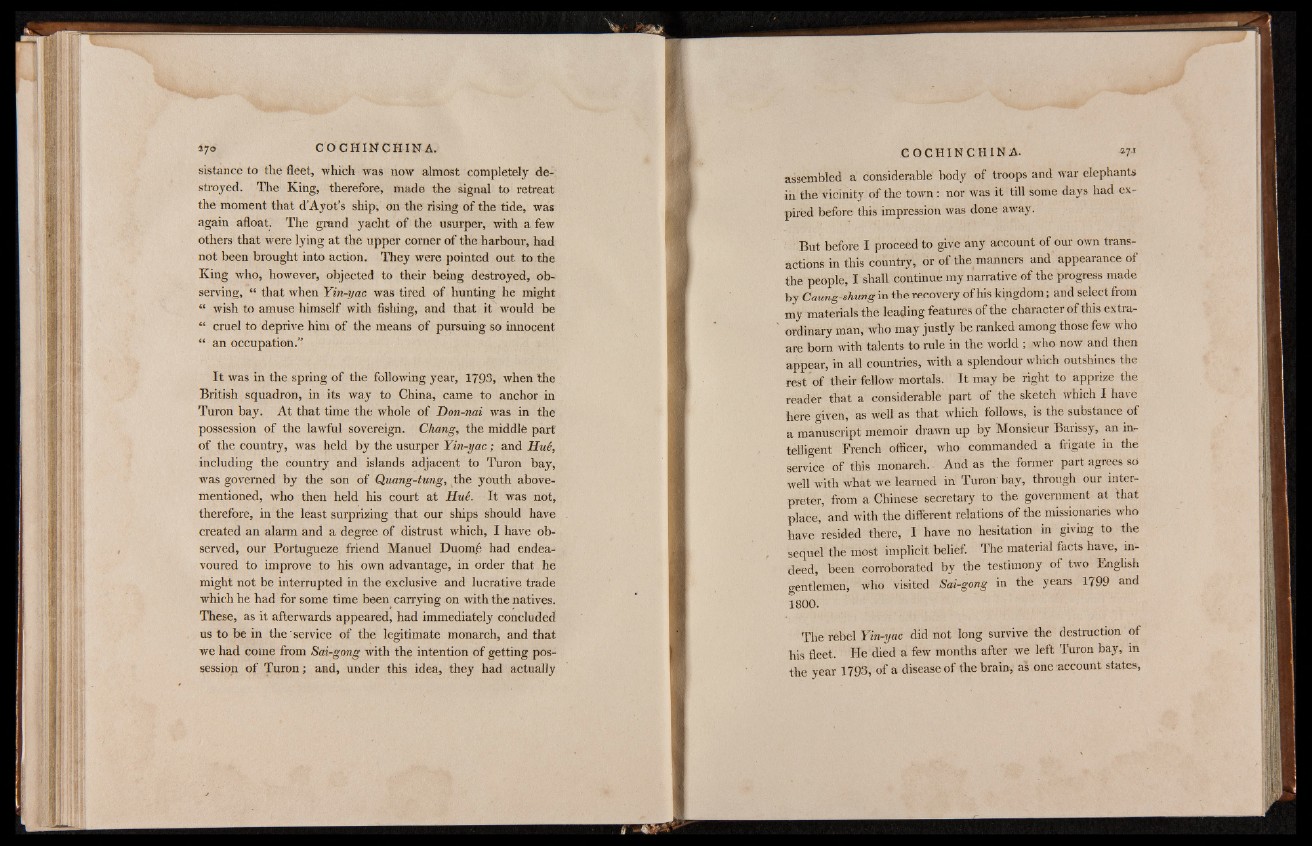
sistancc to the fleet, which was now almost completely destroyed.
The King, therefore, made the signal to retreat
the moment that d’Ayot’s ship, on the rising of the tide, was
again afloat. The grand yacht of the usurper, with a few
others that were lying at the upper corner of the harbour, had
not been brought into action. They were pointed out to the
King who, however, objected to their being destroyed, observing,
“ that when Yin-yac was tired of hunting he might
“ wish to amuse himself with fishing, and that it would be
“ cruel to deprive him of the means of pursuing so innocent
“ an occupation.”
I t was in the spring of the following year, 1793, when the
British squadron, in its way to China, came to anchor in
Turon bay. At that time the whole of Don-nai was in the
possession of the lawful sovereign. Chang, the middle part
of the country, was held by the usurper Yin-yac ; and Hué,
including the country and islands adjacent to Turon bay,
was governed by the son of Quang-tung, the youth above-
mentioned, who then held his court at Hué. I t was not,
therefore, in the least surprizing that our ships should have
created an alarm and a degree of distrust which, I have observed,
our Portugueze friend Manuel Duomé had endeavoured
to improve to his own advantage, in order that he
might not be interrupted in the exclusive and lucrative trade
which he had for some time been carrying on with the natives.
These, as it afterwards appeared, had immediately concluded
us to be in the service of the legitimate monarch, and that
we had come from Sai-gong with the intention of getting possession
of Turon ; and, under this idea, they had actually
assembled a considerable body of troops and war elephants
in the vicinity of the town: nor was it till some days had expired
before this impression was done away.
But before I proceed to give any account of our own transactions
in this country, or of the manners and appearance of
the people, I shall continue my narrative of the progress made
by Caung-shung in the recovery of his kingdom; and select from
my materials the leading features of the character of this extraordinary
man, who may justly be ranked among those few who
are born with talents to rule in the world ; .who now and then
appear, in all countries, with a splendour which outshines the
rest of their fellow mortals. I t may be right to apprize the
reader that a considerable part of the sketch which I have
here given, as well as that which follows, is the substance of
a manuscript memoir drawn up by Monsieur Banssy, an intelligent
French officer, who commanded a frigate in the
service of this monarch. And as the former part agrees so
w e l l with what we learned in Turon bay, through our interpreter,
from a Chinese secretary to the government at that
place, and with the different relations of the missionaries who
have resided there, I have no hesitation in giving to the
sequel the most implicit belief. The material facts have, indeed,
been corroborated by the testimony of two English
gentlemen, who visited Sai-gong in o the years 1799 and
1800.
The rebel Yin-yac did not long survive the destruction of
his fleet. He died a few months after we left Turon bay, in
the year 1793, of a disease of the brain, as one account states,